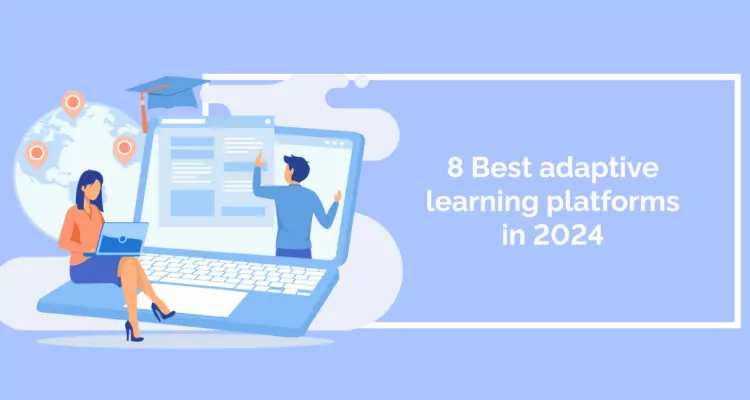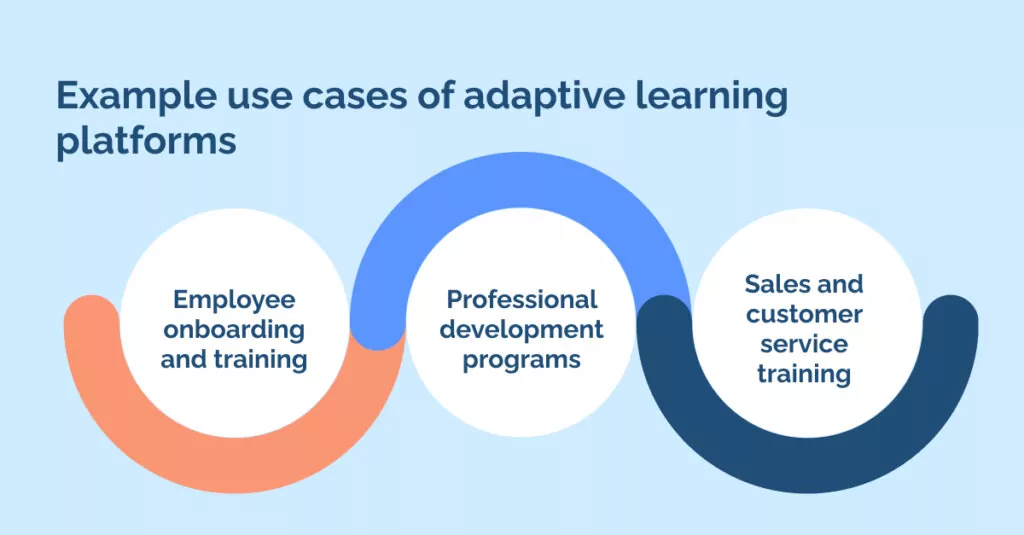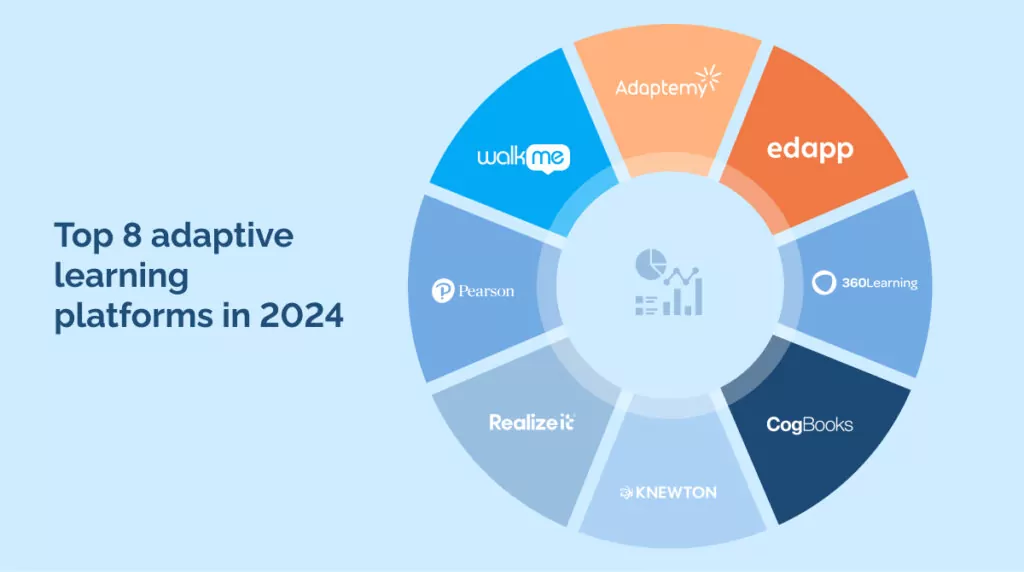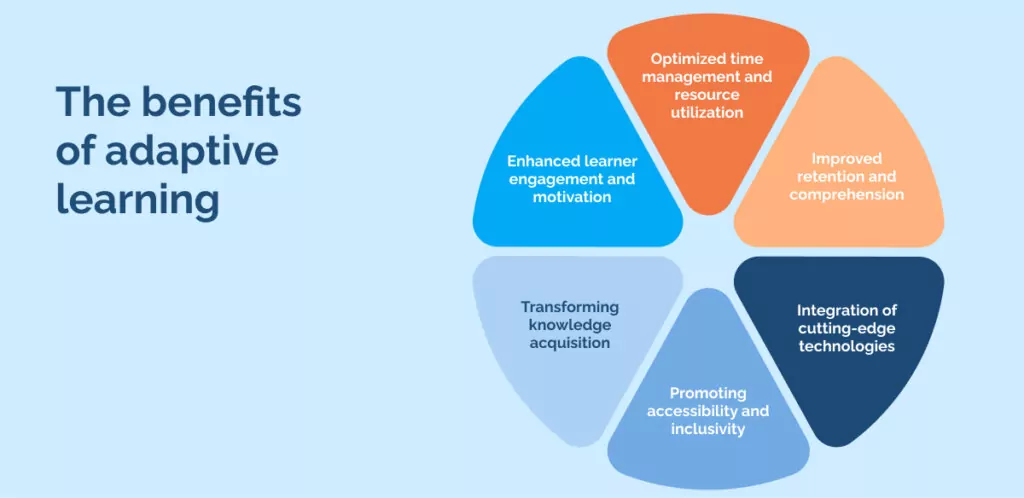
An adaptive learning platform uses computer algorithms and artificial intelligence (AI) to deliver personalized learning experiences. They tailor lessons, readings, practice activities, and assessments to the unique needs of each learner in a just-in-time manner.
The platform adapts to the individual’s learning patterns and performance, providing customized resources and activities that optimize the learning experience.
Organizations are finding more and more ways to use adaptive learning systems as a learning method. And they will continue to be one of the key learning trends as we move into 2024.
This article is for anyone who wants to navigate the adaptive learning technology options available today and in it we will explore:
- The key features of adaptive learning platforms
- The top eight adaptive learning platforms
- Some of the most important use cases for this technology
What are adaptive learning platforms?
Adaptive learning platforms are a technology-driven solution that customizes training and development programs to individual employee’s learning styles, pace, and performance. They use the latest technology to give highly personalized learning experiences to a diverse range of learners.
These systems build on tried-and-tested educational techniques to take learning and development to the next level. They provide instant feedback and rapid changes to the learning journey and effortlessly direct students to the most appropriate resources.
Adaptive learning software is important for any situation where training and development happen: in corporations, language learning centers, healthcare trainers, and more. They can also be found in higher education settings.

Some examples of adaptive learning platform features include:
- Spaced repetition
- Gamification
- Personalized learning plans
- Real-time feedback
- Speed learning tools
- Continual improvement
- Content Variety
- Course creation
- AI support
- Advanced data gathering
- Reporting and analytics functions
- Mobile Optimization
- Software Integration
Adaptive learning technology can transform the learning experiences of learners. But as this list shows, these tools can do much more. They provide insights to leaders, connect with other software, and help people learn on the go.
As a result, the benefits of adaptive learning platforms are clear. They help to overcome many barriers to learning, such as focus, format, accessibility, and motivation.
Top 8 adaptive learning platforms in 2024

If you’re interested in the best adaptive learning experiences for 2024, look no further. In this section, we’ll introduce the top eight adaptive learning platforms for 2024, highlighting their key functions and most important use cases. Review ratings have been taken from G2, where applicable.
1. WalkMe
- Review Rating: 4.5/5
- Ease of Use: Excellent
- Effectiveness: Excellent
- Pricing: Available on application
WalkMe’s digital adoption platform (DAP) enables adaptive learning by providing personalized guidance and support for learners. It uses advanced and responsive artificial intelligence to facilitate adaptation to each individual user’s learning needs.
This technology is especially useful in dynamic environments or those with frequent updates, as it enables the easy building and maintaining of Smart Walk-Thrus. These are guided learning paths that can adapt to changes in user interfaces, flows, or code updates.
2. Adaptemy
- Review Rating: Not available
- Ease of Use: Excellent
- Effectiveness: Good
- Pricing: Available on request
- Best For: Public organizations
Adaptemy, a dynamic adaptive learning platform, stands out with its commitment to personalized education. Driven by AI, it delivers adaptive assessments and real-time feedback, offering a tailored learning experience.
The platform can be used in a wide range of situations, from schools and universities to governmental organizations, to ensure that learners receive content aligned with their unique learning styles.
3. EdApp
- Review Rating: 4.7/5
- Ease of Use: Good
- Effectiveness: Average
- Pricing: Multiple packages are available starting at $0
- Best For: Corporate training on the go
EdApp emerges as a versatile adaptive learning solution with features catering to diverse industries.
Microlearning modules, gamification elements, and a user-friendly interface make it a robust choice for corporate training. Its flexibility is ideal for businesses focused on effective employee development.
4. 360Learning
- Review Rating: 4.6/5
- Ease of Use: Good
- Effectiveness: Good
- Pricing: From $8 per user per month
- Best For: Team-based learning
360Learning fosters collaborative and social learning experiences, making it ideal for team-based scenarios. With peer-to-peer learning, collaborative content creation, and analytics tools, it facilitates a dynamic learning environment. This adaptability aligns well with businesses seeking effective team-based training solutions.
5. CogBooks
- Review Rating: Not available
- Ease of Use: Average
- Effectiveness: Excellent
- Pricing: On request
- Best For: Higher Education
CogBooks brings adaptive learning to higher education with its AI-driven approach. Notable features include personalized content, continuous assessment, and data-driven insights, making it a valuable tool for improving student outcomes. Its effectiveness in higher education makes it an asset for institutions aiming to enhance the learning experience.
6. Knewton
- Review Rating: 4.6/5
- Ease of Use: Good
- Effectiveness: Good
- Pricing: From $10.95 per user per month
- Best For: Engineering or Science manufacturing
Knewton Alta employs a data-driven approach, offering personalized recommendations and adaptive assessments. This adaptability is valuable for higher education settings, where optimizing the learning journey is crucial. Knewton caters to institutions seeking data-driven insights to enhance educational outcomes.
7. Realizeit
- Review Rating: Not available
- Ease of Use: Excellent
- Effectiveness: Good
- Pricing: Available on request
- Best For: Workforce upskilling
Realizeit sets itself apart with a competency-based adaptive learning system. Its features include personalized learning paths and real-time analytics, making it an excellent choice for many functions in workforce training. The platform’s adaptability addresses the diverse needs of learners, enhancing the learning experience.
8. Pearson Interactive Labs
- Review Rating: Not available
- Ease of Use: Good
- Effectiveness: Average
- Pricing: On request
- Best For: Laboratory-based science education
Pearson Interactive Labs, a product of the esteemed educational publisher, integrates interactive content, assessments, and analytics.
This product is designed to complement traditional laboratory-based education in subjects such as biology and microbiology. Its adaptability aligns well with higher education needs, leveraging Pearson’s extensive educational resources. Businesses aiming for a comprehensive educational solution can find value in Pearson Interactive Labs.
What are the benefits of adaptive learning?

In educational and training environments, adaptive learning, a methodological approach, increasingly embraces the principles of tailoring educational experiences to meet individual learner needs.
While many educators and trainers might implement aspects of adaptive learning without fully realizing it, understanding its core benefits can be crucial in deciding whether to adopt this approach more formally.
Enhanced learner engagement and motivation
Adaptive learning strategies excel in engaging learners by aligning educational content with their unique preferences and learning styles. This personalization not only deepens understanding but also elevates the enjoyment and relevance of the learning process. By catering to diverse learning pathways, adaptive learning ensures that each learner finds the material approachable and engaging, leading to increased motivation and a more invested learning journey.
Optimized time management and resource utilization
One of the key strengths of adaptive learning lies in its efficiency. Learners can concentrate on areas that require more attention, maximizing their time and resource investment.
This targeted approach means that learners are not spending undue time on concepts they already understand, leading to a more streamlined and effective learning experience.
Improved retention and comprehension
Adaptive learning platforms are effective in enhancing retention rates. By continuously assessing and reinforcing key concepts, learners are more likely to remember and apply what they’ve learned.
This ongoing reinforcement aids in building a solid foundation of knowledge and skills that are retained over a longer period.
Integration of cutting-edge technologies
Looking forward, integrating advanced technologies like Virtual Reality (VR) and Augmented Reality (AR) in adaptive learning platforms will revolutionize the educational landscape.
These technologies offer immersive and interactive experiences, making learning more dynamic and engaging. The potential of such technologies in adaptive learning extends to creating realistic simulations and scenarios that can enhance practical skills and real-world understanding.
Promoting accessibility and inclusivity
Adaptive learning plays a significant role in making education more accessible and inclusive. By accommodating diverse learning needs and styles, it ensures that learners from various backgrounds have fair access to education.
This inclusivity is vital in creating a learning environment where everyone, regardless of their unique challenges or requirements, can thrive.
Transforming knowledge acquisition
The future of adaptive learning is not merely about enhancing the educational experience; it’s about revolutionizing how knowledge is acquired across various domains.
This approach has the potential to transform learning from a one-size-fits-all model to a personalized journey that recognizes and respects individual differences, learning speeds, and styles.
Example use cases of adaptive learning platforms
If you’re still not sure whether you want to invest in an adaptive learning platform, understanding the use cases may help.
Employee onboarding and training
Adaptive learning proves invaluable in streamlining the onboarding process for new employees. By tailoring training modules based on individual skills, knowledge gaps, and learning preferences, adaptive learning platforms ensure a more efficient and personalized onboarding experience.
This approach not only accelerates the time it takes for new hires to become proficient, but also optimizes the use of resources by focusing on specific areas of need. This adaptability in employee training contributes to a more skilled and engaged workforce from the outset.
Professional development programs
In a rapidly developing business landscape, continuous professional development is essential. Adaptive learning can create personalized learning paths for employees, aligning with their career goals and the evolving requirements of their roles.
This ensures that training is not only relevant but also addresses specific skill gaps, enhancing overall job performance. The adaptability of these programs allows employees to learn at their own pace, increasing engagement and promoting a culture of lifelong learning within the organization.
Sales and customer service training
Adaptive learning plays a crucial role in enhancing the effectiveness of sales and customer service teams.
By tailoring training content to individual strengths and weaknesses, adaptive platforms empower sales professionals with the knowledge and skills needed to excel in their roles. Real-time assessments and feedback ensure continuous improvement, leading to better customer interactions.
Additionally, adaptive learning can simulate various customer scenarios, providing a dynamic training environment that prepares employees for a range of situations they may encounter in the field. This approach not only boosts confidence but also improves overall customer satisfaction.
What’s next for adaptive learning platforms?
For some organizations, adaptive learning platforms will satisfy all the learning and development needs you need. For others, they will just be one part of an ecosystem of learning tools, plugging into other packages like corporate learning management systems (LMS).
Of course, it’s important to get the right tools lined up. In today’s business world, corporations continue to suffer the “Skills Gap” that McKinsey reported in 2021, so engaging employees in the learning process is a vital way to move the company forward.
Adaptive learning platforms help business leaders to meet those challenges. And as we move forward in 2024, we’ll see some exciting capabilities on the horizon, such as integration with virtual reality systems. Adaptive learning is already doing great things with learning: it’s inspiring to think of what could come next.
WalkMe Team
WalkMe spearheaded the Digital Adoption Platform (DAP) for associations to use the maximum capacity of their advanced resources. Utilizing man-made consciousness, AI, and context-oriented direction, WalkMe adds a powerful UI layer to raise the computerized proficiency, everything being equal.



